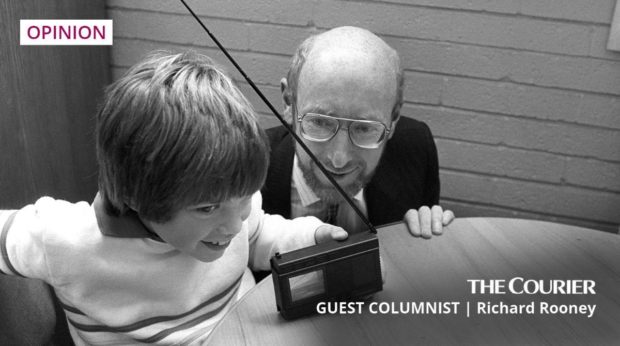Everything changed the day we first saw that little black box…
Up until our world collided with the genius of the late Sir Clive Sinclair, my brothers and I had enjoyed those early 1980s childhoods that now seem impossibly simple reflected on from the 21st century.
We’d moved to a new house in a still-under-construction estate in Glenrothes, and our days were spent exploring the forest behind our garden fence, or pillaging the building sites for wood to build tree houses and carts.
We might have been slap-bang in the middle of Scotland’s much-vaunted “Silicon Glen” but no one told us and we wouldn’t have understood even if they did.

Life was very analogue.
But then one day the boy next door got a Sinclair ZX81 computer and our tiny minds were never the same again.
Robin’s dad was a doctor you see and, well, they had things.
Better bikes… better clothes… better sweets. But none of that came close to his ZX81.
I can’t have been more than six or seven but I can still picture it lying there on his bedroom floor, that beautiful futuristic ‘Sinclair’ logo embossed on the plastic casing.
It was linked to the TV. It had keys and when you pressed them it changed what showed on the screen.
Suddenly, we were no longer just watching. We were doing.
We’d never known that. We never wanted to go back.
And so we did exactly what other odd kids all across the country started to do.
We spent hours making simple games by entering hundreds of lines of BASIC code from magazines using that infuriating ZX81 keyboard.
And then we spent just as many hours trying to find the single error that meant the computer couldn’t understand.
Sir Clive Sinclair paved the way
Although we thought we were just playing games, we were actually learning — about patience and concentration and accuracy and maths and logic and problem solving.
As Chris van Der Kuyl describes below, it set the scene for a whole new industry.
Of course, we soon left the ZX81 behind.
Moore’s Law kicked in and delivered computing perfection in the shape of the Spectrum 48k.
And then other computer gods went and improved on perfection by inventing the Commodore Amiga.
It felt like life had its own Moore’s Law and only ever got better.
Sad to hear that Clive Sinclair has died. The ZX81 was my introduction to computing and I loved it! Started out with a 1k version and eventually saved up for a 16k ram pack – thank you Clive !
— Brian Cox (@ProfBrianCox) September 16, 2021
And then games consoles arrived and spoiled it all by removing the keyboards and making everything too easy.
For those few magical years though, we were the Sinclair generation.
A new world had opened up and it was one we understood better than our parents.
We were free to explore it and to shape it.
So here’s to all those odd kids and our accidental teacher, Sir Clive Sinclair.
May we never grow up.
Chris van der Kuyl: Sir Clive set us on our way
Without Sir Clive Sinclair there would be no games industry in Dundee.
Indeed, without Sir Clive Sinclair bestowing on a generation of the UK’s youth the ability to affordably access computing ahead of the rest of the world Britain would not be a global leader in the world’s largest entertainment industry.
The serendipity of Timex winning the contract to manufacture the ZX Spectrum directly led us to Dundee having more games developers per head of population than anywhere else on Earth.
Sir Clive Sinclair built the entrepreneurial template that many have since followed.
We see his impact in everyone from Steve Jobs to Elon Musk.
I cannot think of a more influential pioneer who paved the road for the rest of us to follow.
— Chris van der Kuyl is an entrepreneur and co-founder and chairman of Scottish games developer 4J Studios.


